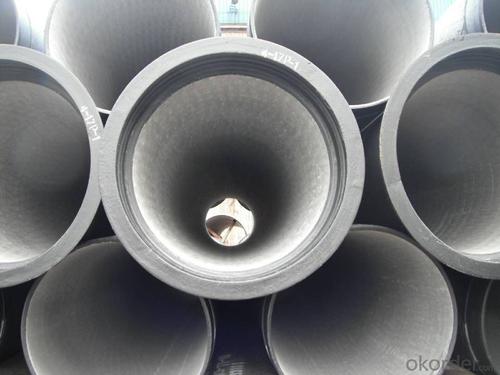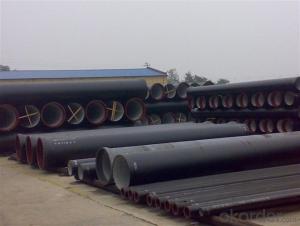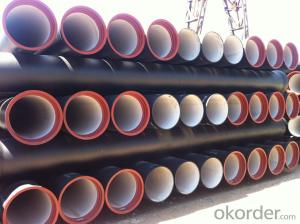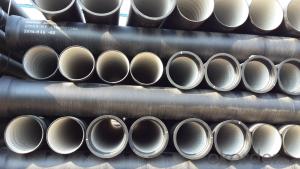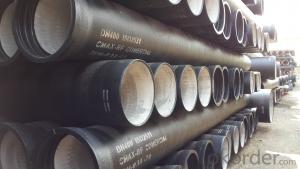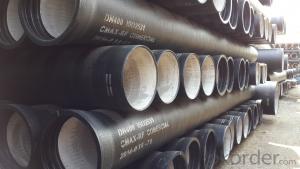DUCTILE IRON PIPE DN200
- Loading Port:
- China Main Port
- Payment Terms:
- TT OR LC
- Min Order Qty:
- -
- Supply Capability:
- -
OKorder Service Pledge
OKorder Financial Service
You Might Also Like
Specification:
1) The standard of pipe: ISO2531:1998, K9
2) Effective length: 6m
3) Inner cement line: Portland cement line as per ISO4179
4) Zinc coating: at least 130g/m2 as per ISO8179
5) Bitumen painting: at least 70um as per ISO8179
6) With 100% quantity of NBR ring, or SBR ring, or EPDM ring as per ISO4633
7) DN80mm-800mm
8) High strength, lighter than grey iron, good corrosion resistance, no furring, small flow resistance, easy fixing, long life tome about 100 yeas
9) Produced by Hangzhou chunfeng machine
10) Checked by automatic inspection equipment
11) Composition:
Chemical composition | |||
Chemical composition | Ductile Cast Iron Pipe (%) | Grey iron pipe (%) | Steel pipe (%) |
C | 3.5-4.0 | 3.2-3.8 | 0.1-0.2 |
Si | 1.9-2.6 | 1.4-2.2 | 0.15-0.4 |
Mn | 0.15-0.45 | 0.4-0.6 | 0.3-0.6 |
P | ≤0.06 | ≤0.3 | 0.02-0.03 |
S | ≤0.02 | ≤0.1 | 0.02-0.03 |
Mg | 0.03-0.06 |
|
|
12) Feature:
Mechanical properties | |||
| Ductile Cast Iron Pipe | Grey Iron Pipe | Steel Pipe |
Tensile Strength(Mpa) | ≥420 | 150-260 | ≥400 |
Yield Strength(Mpa) | ≥300 | No Confirmation | No Confirmation |
Bending Strength(Mpa) | ≥590 | 200-360 | ≥400 |
Elongation (%) | ≥10 | Neglected | ≥18 |
Brinell Hardness(HBS) | ≤230 | ≤230 | About 140 |
13) T type mechanical joint
14) Packing: in bulk or container
- Q: What is cast iron pipe, specification for cast iron pipe?
- According to the different casting methods, the labor intensity is divided into continuous cast iron pipes and centrifugal cast iron pipes, in which the centrifugal cast iron pipes are divided into two kinds: sand mould and metal mould. Divided into gray cast iron pipe and nodular cast iron pipe according to different material. Rubber ring seals for flexible interfaces,
- Q: Does centrifugal cast iron pipe work well with lining cement? Will it scale and breed bacteria?
- The situation in use abroad seems. It is considered that the corrosion of the inner wall of the centrifugal centrifugal ductile iron pipe and the rupture of the pipe are easy to occur when the content of chloride ion exceeds 5O0PPm in the pipe laying environment. This is mainly because, because the cement paste protection layer is the late spraying construction, it is not good to combine with the prefabricated core tube. It often causes water or moisture to seep in and causes oxidation and corrosion of the prestressing steel bars, resulting in fracture. The adhesive interface between cement mortar and centrifugally cast iron pipe is not reasonable. Because of the water absorption of cement, when the water enters the pipe, it is easy to destroy the interface and corroded the inner wall of the centrifugally cast iron pipe. Because it is a brittle material, it is easy to cause sudden accidents.
- Q: How does ductile iron pipe perform in high-temperature steam applications?
- In high-temperature steam applications, ductile iron pipe performs admirably. Ductile iron, renowned for its strength and durability, possesses the capability to endure high pressures and temperatures. When subjected to high-temperature steam, ductile iron pipes retain their structural integrity and are not easily deformed or cracked. They possess a remarkable resistance to thermal expansion and contraction, rendering them suitable for situations where temperature fluctuations are common. Furthermore, ductile iron pipes exhibit exceptional corrosion resistance, a crucial characteristic in steam applications where the presence of moisture can accelerate corrosion. All in all, ductile iron pipes are a dependable choice for high-temperature steam applications, delivering enduring performance and ensuring the secure and efficient transportation of steam.
- Q: What is the lifespan of ductile iron pipe?
- The lifespan of ductile iron pipe can vary depending on various factors such as the quality of the pipe, the environment in which it is installed, and the maintenance practices followed. However, on average, ductile iron pipe has a lifespan of around 80 to 100 years. This long lifespan can be attributed to the inherent durability and strength of ductile iron, which allows it to withstand high pressure, external loads, and environmental conditions. Additionally, ductile iron pipe is often coated with protective linings such as cement mortar or epoxy to further enhance its resistance to corrosion and extend its lifespan. Regular inspections and maintenance can also contribute to prolonging the lifespan of ductile iron pipe by identifying and addressing any potential issues in a timely manner. Ultimately, with proper installation, maintenance, and care, ductile iron pipe can provide reliable and long-lasting service for several decades.
- Q: What's the advantage of FCD50 ductile iron?
- Ductile cast iron pipes are called ductile iron pipes.
- Q: What is ductile iron pipe?
- The main components of ductile iron pipes are carbon, silicon, manganese, sulfur, phosphorus and magnesium. Execution standard GB/T13295-2003ISO2531/2003
- Q: What are the common methods for flow control in ductile iron pipes?
- Ductile iron pipes offer various options for flow control. Among them, valves are commonly used. Valves enable the regulation of water or other fluids flowing through the pipes. They can be either manually operated or automated, depending on the system's specific needs. Flow restrictors or flow limiters represent another method for controlling flow in ductile iron pipes. These devices are installed in the pipes to reduce the flow rate and ensure that the system operates within its intended parameters. Flow restrictors are particularly beneficial in situations where flow control is necessary to prevent damage or optimize system efficiency. Pressure regulators also contribute to flow control in ductile iron pipes. By maintaining a specific pressure level within the system, these devices help prevent excessive pressure that can lead to pipe bursts or other forms of damage. Furthermore, pressure regulators aid in maintaining a consistent pressure throughout the system, ensuring predictable and controlled flow. Flow meters provide yet another means of achieving flow control. These devices are installed in the pipes to measure the rate at which fluid passes through them. By monitoring the flow rate, operators can adjust valves or other flow control devices to maintain flow within the desired range. Flow meters are especially valuable in applications where accurate flow measurement is critical, such as industrial processes or water distribution systems. In conclusion, flow control in ductile iron pipes can be achieved through the use of valves, flow restrictors, pressure regulators, and flow meters. These methods can be combined or used individually, depending on the specific requirements of the system.
- Q: How do ductile iron pipes handle soil erosion?
- Ductile iron pipes are renowned for their exceptional strength and durability, rendering them highly resistant to the erosion of soil. The specific engineering of the material used in these pipes ensures their ability to withstand the detrimental effects of soil erosion, thereby guaranteeing long-lasting and dependable infrastructure. The composition of ductile iron pipes comprises a blend of iron, carbon, and other alloying elements, providing the necessary strength and resilience to withstand the forces exerted by soil erosion. These pipes possess a greater tensile strength than conventional cast iron pipes, enabling them to withstand pressure without deforming or cracking. Furthermore, ductile iron pipes boast a protective layer known as cement mortar lining, which acts as a barrier between the pipe and the surrounding soil. This lining offers an additional layer of resistance against corrosion and erosion caused by the chemical composition or abrasive particles present in the soil. Consequently, ductile iron pipes remain intact and continue to function effectively, even in areas experiencing high rates of soil erosion. In terms of installation, ductile iron pipes are specifically designed to be buried underground, ensuring their robust protection from direct contact with the soil. Additionally, their jointing systems are designed to provide secure and watertight connections, minimizing the risk of soil infiltration and subsequent erosion. Overall, ductile iron pipes have a proven track record of effectively combating soil erosion due to their superior strength, protective linings, and appropriate installation techniques. They offer a reliable and long-lasting solution for water and wastewater infrastructure, even in regions prone to soil erosion.
- Q: How do ductile iron pipes handle internal scale buildup?
- Ductile iron pipes are highly resistant to internal scale buildup due to their smooth inner surface. The material's inherent strength and durability allow it to withstand the pressure exerted by scale deposits without significant damage or reduced performance. Additionally, the smooth surface of ductile iron pipes minimizes the adhesion of scale, preventing its accumulation and ensuring efficient flow of water or other fluids. Regular maintenance and periodic cleaning can further enhance the longevity and performance of ductile iron pipes in managing any potential scale buildup.
- Q: Can ductile iron pipes be used for wastewater reuse projects?
- Yes, ductile iron pipes can be used for wastewater reuse projects. Ductile iron pipes have several properties that make them suitable for such projects. Firstly, they have high strength and durability, which allows them to withstand the pressure and load requirements of wastewater systems. Additionally, ductile iron pipes have excellent corrosion resistance, which is important in wastewater applications where the presence of chemicals and corrosive substances is common. Furthermore, ductile iron pipes have a smooth internal lining, which reduces friction and improves the flow of wastewater. This is crucial for efficient transportation and distribution of wastewater in reuse projects. Moreover, ductile iron pipes are also known for their ease of installation and maintenance. They can be easily connected using various joint options, allowing for quick and efficient installation. Additionally, ductile iron pipes have a long service life, reducing the need for frequent replacements and minimizing maintenance costs. Overall, the properties of ductile iron pipes make them a suitable choice for wastewater reuse projects, providing strength, durability, corrosion resistance, smooth flow, and ease of installation and maintenance.
Send your message to us
DUCTILE IRON PIPE DN200
- Loading Port:
- China Main Port
- Payment Terms:
- TT OR LC
- Min Order Qty:
- -
- Supply Capability:
- -
OKorder Service Pledge
OKorder Financial Service
Similar products
Hot products
Hot Searches
Related keywords




